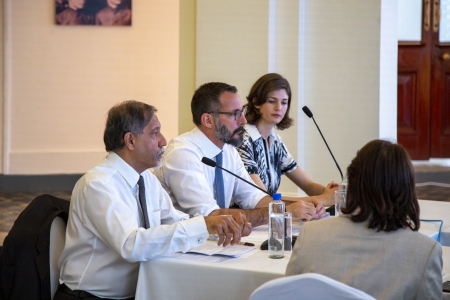Note: Audio is placed below the main text, when available.
Prince Rahim visits East Africa to evaluate AKDN’s response to environmental sustainability and climate change 2020-03-07
In early March, Prince Rahim, accompanied by his wife, Princess Salwa, visited Kenya and Tanzania, to better understand the plans and responses of the various institutions and agencies of the Aga Khan Development Network (AKDN) towards environmental sustainability and climate action.
Prince Rahim’s visit to Kenya took place in his capacity as Chair of the AKDN Environment and Climate Committee (ECC), which was recently established to develop a policy framework on priorities related to the environment and climate change for implementation by AKDN globally.
During their 6-day visit to Kenya, Prince Rahim and Princess Salwa visited a number of AKDN institutions and projects to learn more about what each is doing to mitigate environmental degradation through specific interventions such as adopting renewable energy, harvesting rainwater, recycling waste, and planting trees.
At the Aga Khan Academy in Mombasa, Prince Rahim and Princess Salwa met with administrators, faculty and students, where they heard about the school’s initiatives to integrate knowledge on the environment and climate into the curriculum as well as about student projects focusing on finding solutions to the challenge of environmental degradation and climate change.
In Nairobi, Prince Rahim and Princess Salwa visited a number of companies that comprise Industrial Promotion Services (IPS), the part of the Aga Khan Fund for Economic Development (AKFED) focusing on infrastructure and industrial development. These included Farmer’s Choice, Frigoken and Allpack Industries.
In Murang’a County, Prince Rahim and Princess Salwa saw how Frigoken – an IPS agro-industrial company working with farmers to add value to their products – has partnered with The Nature Conservancy (TNC) to introduce climate change adaptation measures to help small-scale farmers, including water pans for harvesting rainwater, drip irrigation, agroforestry and composting.
In Nairobi, Prince Rahim and Princess Salwa were shown how Allpack Industries, an IPS company that manufactures corrugated cardboard, has introduced a biomass boiler, as well as a 560KW solar power unit, among other interventions, to enhance energy efficiency, reduce water use and improve on industrial waste management.
While at the Nation Media Group’s state-of-the-art printing plant, Prince Rahim and Princess Salwa were taken through measures that the media house has put into place to reduce energy consumption, improve industrial waste management and enhance safety on site. They also learned about NMG’s tree planting, awareness raising, and community engagement activities.
The Prince and Princess also visited Serena Hotel Nairobi, part of the Tourism Promotion Services (TPS) division of the Aga Khan Fund for Economic Development (AKFED). Among other environmental initiatives, Serena Hotels have introduced solar power generation capacity at many of their safari lodges in Kenya.
At the Aga Khan University Hospital, Nairobi, the visitors were shown plans for the new 12-storey University Centre, the Specialty Children’s Hospital and the proposed University Hospital in Kampala. Prince Rahim and Princess Salwa also made a day trip to Arusha, Tanzania to see AKU’s land there and to learn about the university’s community outreach initiatives including its agricultural demonstration plots aimed at teaching local farmers about innovative agricultural techniques. Discussions with AKU in Nairobi and Arusha centred on environmental sustainability initiatives and the energy efficiency and environment-friendly strategies that the university is aiming to put in place for its upcoming projects.
In Nakuru County, Prince Rahim and Princess Salwa visited KenGen’s Olkaria Geothermal Power Station near Naivasha — the oldest and largest geothermal power station in Africa — where they received a tour of the facility and a presentation on the importance of geothermal power as part of Kenya’s overall energy mix.
On Monday 9 March, Prince Rahim chaired a Roundtable with AKDN agencies and key external stakeholders and partners in the environmental field to discuss progress and the potential for enhanced partnerships and joint action.
The Roundtable, which was held at the historic Town Jamatkhana (Khoja Mosque), was attended by members of the AKDN Environment and Climate Committee (ECC): Princess Salwa, Dr Paul Dhalla and Mr Lutaf Kassam. Also in attendance were the Diplomatic Representative of the Aga Khan Development Network in Kenya, Dr Azim Lakhani and other senior leadership from AKDN agencies in Kenya. Representatives from various other organisations also participated, including the United Nations Environment Programme (UNEP), The Nature Conservancy (TNC), the Trillion Trees initiative and Global Wildlife Conservancy.
Key objectives of the Roundtable included learning about the initiatives of AKDN and its partners around environmental sustainability; challenges encountered and lessons learned from the implementation of these initiatives; and exploring possibilities for enhanced collaboration between AKDN and its partners aimed at developing practical and feasible programmes likely to have a positive impact.
Significant outcomes from the discussions included a commitment to enhancing joint efforts to collaborate on raising awareness about climate change and to mitigate risks; scaling up existing sustainability initiatives to improve energy efficiency and reduce consumption; developing climate mitigation strategies and metrics, as well as nature-based solutions to offset carbon emissions throughout AKDN.
- 6275 reads
Images
Recent Articles
AKU students launch environment-focused societies in Tanzania and Pakistan 2023-08-15
Posted September 4th, 2023 by librarian-hdWith every passing day, the consequences of climate change and biodiversity loss become ever more apparent. Increasing incidences of extreme weather, natural disasters and disease outbreaks are now becoming the new normal. The most concerning part is that these incidences are not isolated but instead are part of a chain reaction with devastating effects throughout the globe.
- Read more
- 125 reads
All Related Articles
| News Article | AKU students launch environment-focused societies in Tanzania and Pakistan 2023-08-15 | www.aku.edu |
 Ismaili.NET - Heritage F.I.E.L.D.
Ismaili.NET - Heritage F.I.E.L.D.

